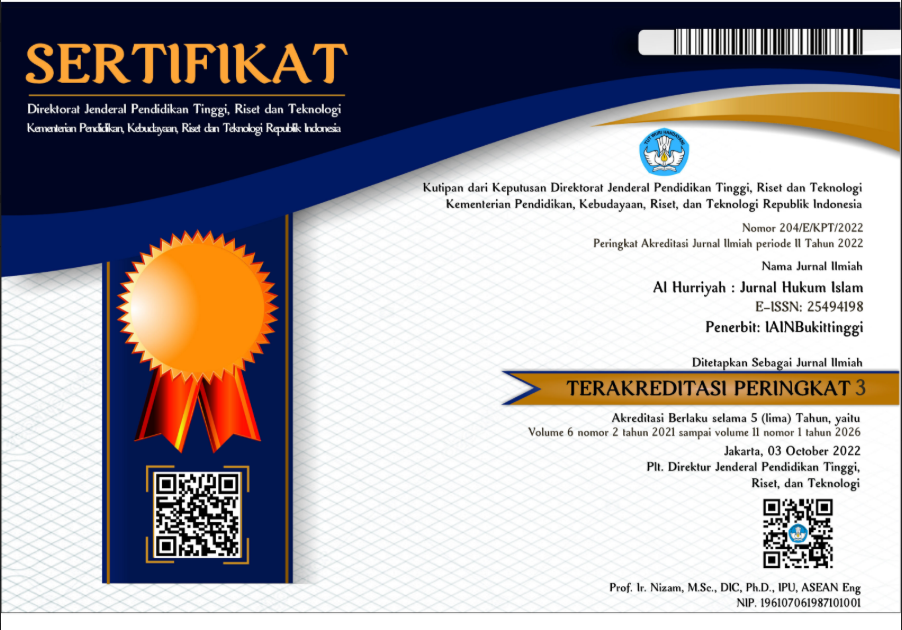The Dynamics of Legal Protection in Indonesia Against the Role of the Second Wife
DOI:
https://doi.org/10.30983/al-hurriyah.v10i1.8953Keywords:
Legal Protection, Second Wife, PoligamyAbstract
This article aims to comprehensively examine polygamy from various perspectives, with a particular focus on the legal protection afforded to second wives within polygamous practices in Indonesia. It explores the complex dynamics experienced by women who occupy the position of a second wife, including their roles, rights, and social perceptions. Furthermore, this study seeks to deconstruct the existence and identity of women in polygamous marriages by critically assessing the challenges they face and the efforts made to safeguard their legal and social well-being. Employing a qualitative research approach, this study utilizes Simone de Beauvoir’s existentialist feminism theory as an analytical framework to understand how women’s roles in polygamy are constructed and contested within patriarchal legal and social systems. The findings reveal that, although polygamy is permitted under Indonesian law, its practical implementation often leads to various injustices, particularly in the form of legal uncertainty and limited protection for second wives. These women frequently encounter stereotyping, social stigma, discrimination, and even the threat of criminal consequences when the polygamous marriage is carried out without the consent of the first wife. This article advocates for the reconstruction of the identity and social role of second wives, emphasizing the need for comprehensive legal reforms, increased public awareness, and the promotion of marriage registration to ensure the fulfillment of women’s rights and the creation of a more equitable marital framework in polygamous settings.
References
Book
A. Muri Yusuf, Metode Penelitian Kualitatif, Kualitatif Dan Penelitian Gabungan (Jakarta: Prenada Media Grup, 2014).
Izomiddin, Pemikiran Dan Filsafat Hukum Islam (Jakarta: Kencana, 2018).
Nanda Dwi Rizkia and Hardi Fardiansyah, Metode Penelitian Hukum (Normatif Dan Empiris), ed. Elan Jaelani (Bandung: Widina Media Utama, 2023).
Siti Musdah Mulia, Islam Menggugat Poligami, 2nd ed. (Jakarta: PT Gramedia Pustaka Utama, 2007).
Journal
Abdul Aziz, “CHARACTERISTICS OF THE COMPILATION OF ISLAMIC LAW IN INDONESIA: A STUDY OF MARRIAGE LAW FROM THE PERSPECTIVE OF POLITICAL LAW,” Indonesian Journal of Islamic Jurisprudence, Economic and Legal Theory 2, no. 4 (2024), https://doi.org/10.58812/eslhr.v1.i03.
Adriana Mustafa and Arwini Bahram, “Relasi Gender Dalam Pernikahan Keturunan Sayyid Di Desa Cikoang Kabupaten Takalar; Studi Kasus Perbandingan Hukum Islam Dan Hukum Adat,” Mazahibuna, December 23, 2020, 241–54, https://doi.org/10.24252/mh.v2i2.18137.
Ahmad Briyan Pratama et al., “Dinamika Pertumbuhan Fiqih Masa Imam Madzab Serta Implikasinya Terhadap Penyelesaian Isu Poligami,” Jurnal Kajian Islam Dan Sosial Keagamaan 2, no. 2 (2024): 368–75, https://jurnal.ittc.web.id/index.php/jkis/index.
Ahmad Hidhir Adib, Moch Said Ahmad, and Narse Nur Afida, “Monogamy As The Substance of Pre-Nuptial Agreement: A Cross-Mazhab Comparative Study,” YUDISIA: Jurnal Pemikiran Hukum Dan Hukum Islam 15, no. 2 (December 2024), https://journal.iainkudus.ac.id/index.php/Yudisia/index.
Ali Yasmanto, “Keadilan Dalam Poligami: Studi Pemikiran Fazlur Rahman M. Quraish Shihab,” Journal of Islamic Law and Family Studies, no. 1 (2021): 35–46.
Bian Ambarayadi and Andi Molawaliada Patodongi, “Keluarga Poligami Dalam Negara-Negara Islam,” As-Syar’i: Jurnal Bimbingan & Konseling Keluarga 6, no. 2 (2024), https://doi.org/10.47476/assyari.v6i2.6663.
Devi Kasumawati and Uin Sultan Aji Muhammad Idris Samarinda, “KEBIJAKAN HUKUM PERKAWINAN POLIGAMI DALAM PEMENUHAN HAK ISTRI KEDUA BERDASARKAN SISTEM PERADILAN DI INDONESIA (Studi Komparasi Fiqih Munakahat Dan SEMA No 2 Tahun 2019 ),” Tahun 2019) Mitsaq: Islamic Family Law Journal, vol. 3, 2025, www.badilag.net.
Dri Santoso and Muhamad Nasrudin, “Poligamy in Indonesia and Its Relevance to the Protection of Women and Children in the Perspective of Islamic Law Philosophy,” AKADEMIKA: Jurnal Pemikiran Islam 26, no. 1 (June 30, 2021): 121, https://doi.org/10.32332/akademika.v26i1.2406.
Dian Septiandani, Ani Triwati, and Efi Yulistyowati, “Kemaslahatan Dalam Perkawinan Poligami Dalam Kajian Hukum Islam Dan Hukum Positif Indonesia.
Hervin Yoki Pradikta, “The Point of Views of Indonesian Mufassir (M. Quraish Shihab and Hamka) on Polygamy and Its Relevance to Legislation in Indonesia,” KnE Social Sciences, January 11, 2024, https://doi.org/10.18502/kss.v9i2.14991.
Husni, S., Syahriani, F., Husni, A. ., Wahid, A., & Ngardi, V. (2024). Determination of Nasab of Children Outside of Marriage in the Islamic Legal System: The Role and Decisions of Religious Courts in Indonesia. Hakamain: Journal of Sharia and Law Studies, 3(1), 26–36. https://doi.org/10.57255/hakamain.v3i1.332
Hotnidah Nasution and Ahmad Rifqi Muchtar, “Negotiating Islamic Law: The Practice of Inheritance Distribution in Polygamous Marriages in Indonesian Islamic Courts,” Al-Manahij: Jurnal Kajian Hukum Islam 18, no. 1 (March 14, 2024): 125–44, https://doi.org/10.24090/mnh.v18i1.10921.
Inas Zulfa Sulasno and Eman Suparman, “JURIDICAL REVIEW OF THE STATUS OF CHILDREN OF POLYGAMOUS MARRIAGES NOT APPROVED BY THE FIRST WIFE UNDER ISLAMIC LAW AND INDONESIAN LEGISLATION,” EDUNITY 2, no. 7 (2023).
Kazi Md Mukitul Islam and M. Niaz Asadullah, “Gender Stereotypes and Education: A Comparative Content Analysis of Malaysian, Indonesian, Pakistani and Bangladeshi Mazhab Textbooks,” PLoS ONE 13, no. 1 (July 1, 2019), https://doi.org/10.1371/journal.pone.0190807.
M. Sholihin and Koentjoro, “Marital Satisfaction of Second Wives Undergoing Siri Polygamy among Orêng Kênêk,” Indigenous: Jurnal Ilmiah Psikologi 8, no. 3 (November 30, 2023): 325–36, https://doi.org/10.23917/indigenous.v8i3.2222.
M Sifa et al., “Monogami, Poligami Dan Perceraian (Menurut Hukum Islam Dan Peraturan Perundang-Undangan Di Indonesia) Monogamy, Polygamy and Divorce (According to Islamic Law and Legislation in Indonesia),” Jurnal Kolaboratif Sains 8, no. 1 (2025): 454–66, https://doi.org/10.56338/jks.v8i1.6802.
Mhd Yadi Harahap, Ramadhan Syahmedi, and Zaiunudin, “Konsekuensi Hukum Poligami Di Indonesia Dan Tunisia: Perspektif Teori Kepastian Hukum Dan Maslahah Mursalah,” Al-Mashlahah: Jurnal Hukum Islam Dan Pranata Sosial Islam, 2022, https://doi.org/10.30868/am.v10i01.2770.
Misbahul Munir Makka and Tuti Fajriati Ratundelang, “Poligami Tanpa Izin Istri Pertama Dan DampaknyaTerhadap Keluarga,” Journal of Islamic Family Law 2, no. 1 (2022): 34–51, http://journal.iain-manado.ac.id/index.php/almujtahid.
Mughni Labib Ilhamuddin Is Ashidiqie, “Poligami Dalam Tinjauan Syariat Dan Realitas,” Al-Ahwal Al-Syakhsiyyah: Jurnal Hukum Keluarga Dan Peradilan Islam 2, no. 2 (2021): 199–218, https://doi.org/10.15575/as.v2i2.14332.
Muhammad Ajib Abd Razak, Intan Hashimah Mohd Hashim, and Syazwani Drani, “How Do First Wives View Polygamy in Terms of Adaptation and Family Cohesiveness?,” International Journal of Academic Research in Business and Social Sciences 12, no. 1 (January 18, 2022), https://doi.org/10.6007/ijarbss/v12-i1/12170.
Muhammad Alfian and Muhammad Roy Purwanto, “Critical Analysis of Orientalist Understanding of Polygamy Sharia,” International Journal of Science and Society, vol. 6, 2024, http://ijsoc.goacademica.com.
Muhammad Dzakwan Ma, Muhammad Akmal Inayatur Rahman, and Muhammad Fickriansya Alfarizi, “Poligamy in Islamic Point of View,” Jurnal Religion: Jurnal Agama, Sosial, Dan Budaya 1, no. 6 (2023), https://maryamsejahtera.com/index.php/Religion/index.
Muhammad Nur and Dhiauddin Tanjung, “Contextualization of Polygamy Law; Justification of Islamic Legal Principles against Positive Regulations in Indonesia,” Jurisprudensi: Jurnal Ilmu Syariah, Perundang-Undangan Dan Ekonomi Islam 16, no. 2 (July 31, 2024): 273–87, https://doi.org/10.32505/jurisprudensi.v16i2.8108.
Riyandi S, “Implikasi Poligami Dalam Interpretasi Al-Qur’an: Pandangan Ulama, Tafsir Kontemporer, Dan Perspektif Kementerian Agama RI,” AMEENA Journal 1, no. 3 (2023): 254.
Selamat Lumban Gaol, “Division of Inheritance and Will: First Marital Children, Second Marital Wife (Literature Legal Review),” Journal of Law, Politic and Humanities 4, no. 3 (2024), https://doi.org/10.38035/jlph.v4i3.
Sugianto Sugianto, Abdurohim Abdurohim, and Oriza Aditya, “Legal Reconstruction and Polygamy Problems in Sharia Maqashid and Positive Law Perspectives,” Journal of Social Science 3, no. 5 (September 21, 2022): 1046–55, https://doi.org/10.46799/jss.v3i5.411.
Suud Sarim Karimullah, “A Feminist Critique of the Practice of Polygamy in the Context of Islamic Law and Human Rights,” Indonesian Journal of Law and Islamic Law (IJLIL) 6, no. 1 (June 17, 2024): 38–53, https://doi.org/10.35719/ijlil.v6i1.354.
T. D. Wirastri and S. C. van Huis, “The Second Wife: Ambivalences towards State Regulation of Polygamy in Indonesia,” The Journal of Legal Pluralism and Unofficial Law 53, no. 2 (2021).
Thasyalina Amarthalia et al., “Reflection of Women Struggle Through the Main Character in Olivia Newman’s Where the Crawdads Sing (2022)” 13, no. 1 (2025): 173–90, https://doi.org/10.24256/ideas.
Vintges K. Simone de Beauvoir, “A Feminist Thinker for Our Times,” Hypatia 14, no. 4 (1999): 133–44.
Vivi Ariyanti et al., “The Dynamics of Polygamy and Divorce in Muslim Contries History of Author Abstract,” vol. 2, 2023.
Yasrianto and Gempa Maulana, “Upaya Pencegahan Poligami Di Negara Muslim (Tunisia, Pakistan, Malaysia, Iran, Dan Indonesia),” QIYAS: Jurnal Hukum Islam Dan Peradilan, 2024.
Yenny Febrianty et al., “Answering the Challenges of Polygamy: Justice and Legal Protection in Islamic and Indonesian Law,” Jurnal Ilmiah Mizani: Wacana Hukum, Ekonomi Dan Keagamaan 12, no. 1 (April 14, 2025): 15, https://doi.org/10.29300/mzn.v12i1.6930.
Yessy Meivitasari and Ken Widyatwati, “Bentuk Ketidakadilan Gender Dan Perlawanan Tokoh Kinanti Dalam Novel Layangan Putus (Kajian Feminisme Eksistensialisme Simone de Behaviour),” Diglosia: Jurnal Kajian Bahasa, Sastra, Dan Pengajarannya 6, no. 4 (November 2, 2023).
Zainul Fitriyyah et al., “Suka Dan Duka Menjadi Yang Kedua (Studi Kualitatif Fenomenologi Kepuasan Pernikahan Pada Perempuan Yang Menjadi Istri Kedua Dalam Pernikahan Poligami),” Jurnal Empati 9, no. 3 (2023): 249–55.
Zahra, Nabila Inita, and Endri Yenti. ‘The Formal Validity of Children’s Status Reviewed in Terms of Maslahah Mursalah’. USRATY : Journal of Islamic Family Law 2, no. 2 (21 December 2024): 134–43. https://doi.org/10.30983/usraty.v2i2.8781.
Regulation
Law Number 1 of 1974 jo. Law Number 16 of 2019 concerning Marriage (Undang-Undang Nomor 1 Tahun 1974 jo. Undang-Undang Nomor 16 Tahun 2019 tentang Perkawinan)
Downloads
Published
How to Cite
Issue
Section
Citation Check
License
Copyright (c) 2025 Suharti Suharti, Suci Ramadhani Putri, Nizamudin Nizamudin, Baiq Ratna Mulhimmah

This work is licensed under a Creative Commons Attribution-ShareAlike 4.0 International License.
Authors who publish with this journal agree to the following terms:
- Authors retain copyright and grant the journal right of first publication with the work simultaneously licensed under a Creative Commons Attribution-ShareAlike 4.0 International License that allows others to share the work with an acknowledgment of the work's authorship and initial publication in this journal.
- Authors are able to enter into separate, additional contractual arrangements for the non-exclusive distribution of the journal's published version of the work (e.g., post it to an institutional repository or publish it in a book), with an acknowledgment of its initial publication in this journal.
- Authors are permitted and encouraged to post their work online (e.g., in institutional repositories or on their website) prior to and during the submission process, as it can lead to productive exchanges, as well as earlier and greater citation of published work (See The Effect of Open Access).





